Expert’s Rating
Pros
- Beautiful OLED screen
- Compact and lightweight
- Solid performance for the price
Cons
- Keyboard is a tad mushy
- Annoying bloatware
Our Verdict
The HP Omen Transcend 14 has a beautiful screen, runs surprisingly quiet and cool, and it’s light enough to take with you everywhere. But gamers who want maximum performance over all else should look elsewhere.
Price When Reviewed
$1,699
Best Prices Today: HP Omen Transcend 14
$1699
The HP Omen Transcend 14 is a striking machine. The beautiful OLED display and translucent key caps hit you with vibrant color as soon as you turn it on. When you pick it up, you’re struck by how compact and lightweight it is for the specs and all-metal chassis it offers. Fire up a game and you’re impressed by how well modern games run on a laptop this light, compact, and comparatively inexpensive. Nothing is perfect, so there are some catches — and this isn’t the right machine for everyone — but it’s a great laptop.
Looking for more options? Check out PCWorld’s roundup of the best gaming laptops.
HP Omen Transcend 14: Specs
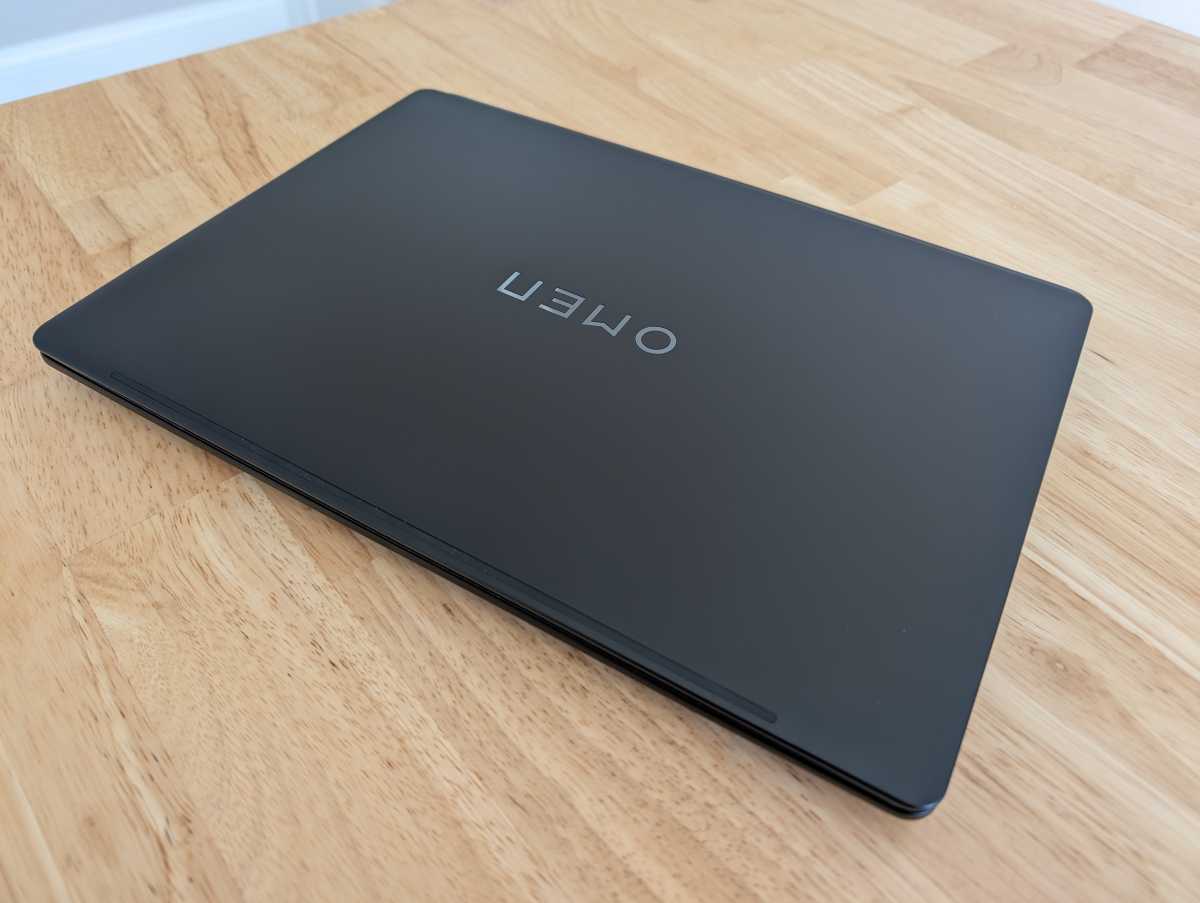
IDG / Chris Hoffman
The HP Omen Transcend 14 is, like most gaming laptops, available in a variety of configurations you can customize. The machine we reviewed comes at a retail price of $1,699 and had an Intel Core Ultra 7 155H CPU, Nvidia GeForce RTX 4060 graphics, 16GB of RAM, and a 1TB SSD.
The laptop’s base model starts at a retail price of $1,499 and includes the same CPU — but steps down to GeForce RTX 4050 graphics and a 512 GB SSD. You can customize the laptop and get up to Nvidia GeForce RTX 4070 graphics, an Intel Core Ultra 9 185H CPU, 32GB of RAM, and 2TB of storage. Our review model included Wi-Fi 7 and Bluetooth 5.4, although many models come with Wi-Fi 6E and Bluetooth 5.3.
When we were reviewing this laptop, HP was already offering a promotional discount on its website for $300 off, with the laptop’s base price starting at $1,199. It’s an even better value during a promotion like that one.
CPU: Intel Core Ultra 7 155H
Memory: 16 GB LPDDR5-7467
Graphics/GPU: NVIDIA GeForce RTX 4060
Display: 14-inch 2.8k 2880×1800 120Hz HDR OLED
Storage: 1TB PCIe Gen 4 NVMe SSD
Webcam: 1080p webcam
Connectivity: 1x Thunderbolt 4 / USB Type-C 40Gbps with USB Power Delivery and DisplayPort 1.4, 1x USB Type-C 10Gbps with USB Power Delivery and DisplayPort 1.4, 2x USB Type-A 10Gbps, 1x HDMI 2.1, 1x combo headphone jack
Networking: Wi-Fi 7 and Bluetooth 5.4
Biometrics: IR camera for Windows Hello
Battery capacity: 71 Watt-hours
Dimensions: 12.32 inches x 9.19 inches x 0.71 inches
Weight: 3.6 lbs
MSRP: $1,699 as tested ($1,499 base)
HP Omen Transcend 14: Design and build quality
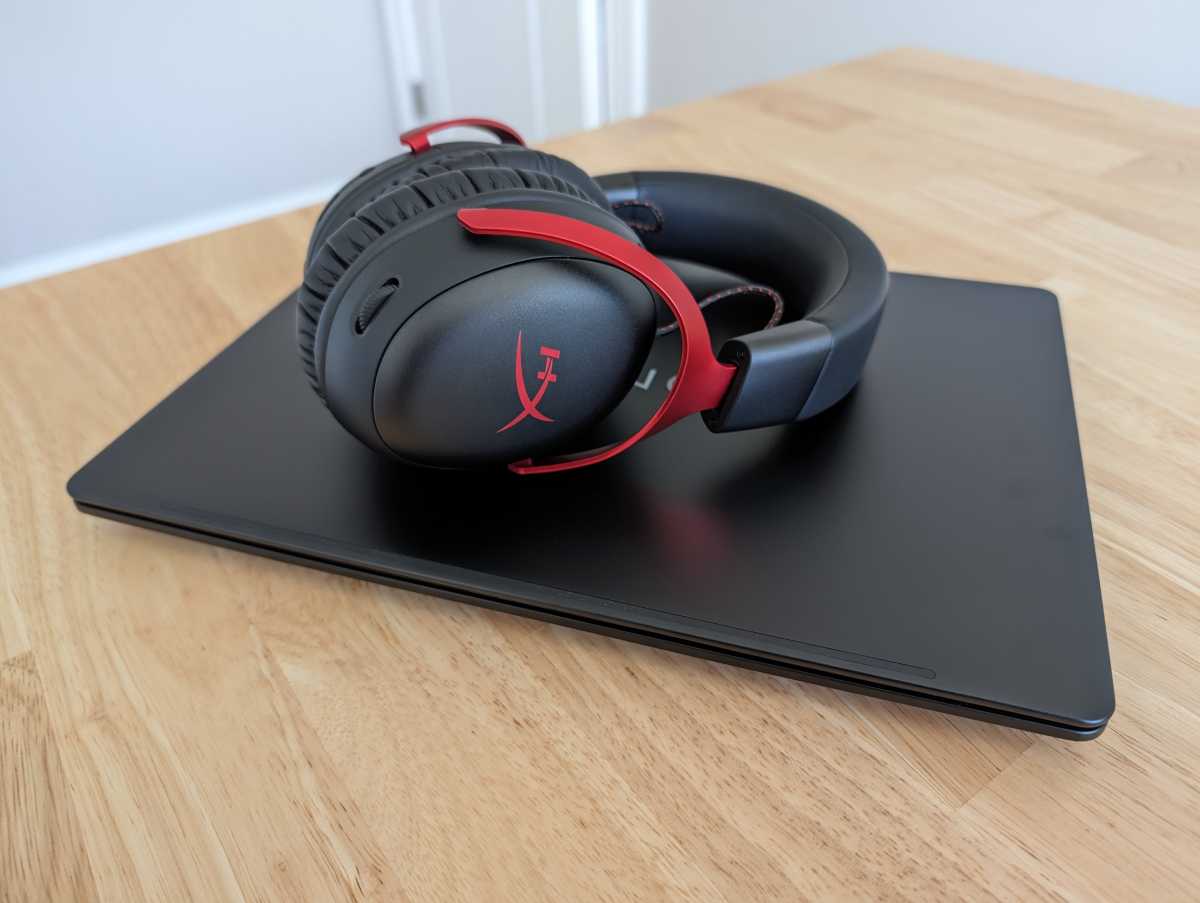
IDG / Chris Hoffman
The HP Omen Transcend 14 looks even more vibrant and colorful in person than it does in photos. It’s sleek, compact, and solid. There’s no glowing logo on the back of the laptop — just the word “OMEN.” If someone isn’t aware this is the name of a gaming brand, it may not even look like a gaming laptop to them. On the inside, the laptop also doesn’t look ostentatiously like a gaming laptop.
That is… until the LED keyboard lights come on! Then it really looks like a gaming laptop. Our review model had a keyboard with four zones of lighting. (HP says per-key lighting will be available in some future models.) The keys are modeled after the “Pudding” key caps found on HyperX keyboards, so you see the LED lighting spill out from the keys. It’s bright and colorful, and it stands out. Despite the understated overall design, the keyboard LEDs give this a bright and attractive gamer aesthetic when you want that sort of thing. But, with the press of a key, you can turn off those LEDs and the laptop won’t look out of place in a classroom or conference room.
Personally, I love the look — it’s colorful and doesn’t look like most other gaming laptops I’ve come across. It stands out. The keyboard’s LED lighting is also a nice compliment to the also bright and colorful OLED screen, which I’ll get to in a second.
Build quality is good, too. It’s all metal — no creaky plastic or anything like that here. At 3.6 pounds, it’s a little heavier than the average ultraportable — but only a tad. It’s a nice compact size and feels plenty sturdy. The hinge feels solid. The screen doesn’t “lie flat” — in other words, open to 180 degrees — like some other laptops I’ve tested recently, but that’s no big deal. The cooling works well, with the air blowing out the back of the machine (like it should) and not onto your mouse hand. The keyboard stays a very reasonable temperature while gaming, too.
The software setup out of the box isn’t great, though. HP has gone the traditional route of packing the laptop with a lot of bloatware, including McAfee antivirus preinstalled — the review model I tested included a fully licensed version, but I imagine the consumer model will include a free trial with nag screens. There’s also the “Omen Gaming Hub” that will frequently pop up notifications telling you how it “freed up RAM” with Boost, something that’s unnecessary and not worth an interruption.
The HP Support Assistant app is pinned to the taskbar by default, advertising important messages. When I opened it up, it started with thirteen unread messages it wanted me to read. No one needs another message-packed inbox to deal with, HP. It’s a ridiculous way to set the laptop up out of the box, but of course you can remove all this software if you like. It’s annoying at first, but it’s not a dealbreaker — it doesn’t matter that much when it’s easy to remove.
HP Omen Transcend 14: Keyboard and trackpad
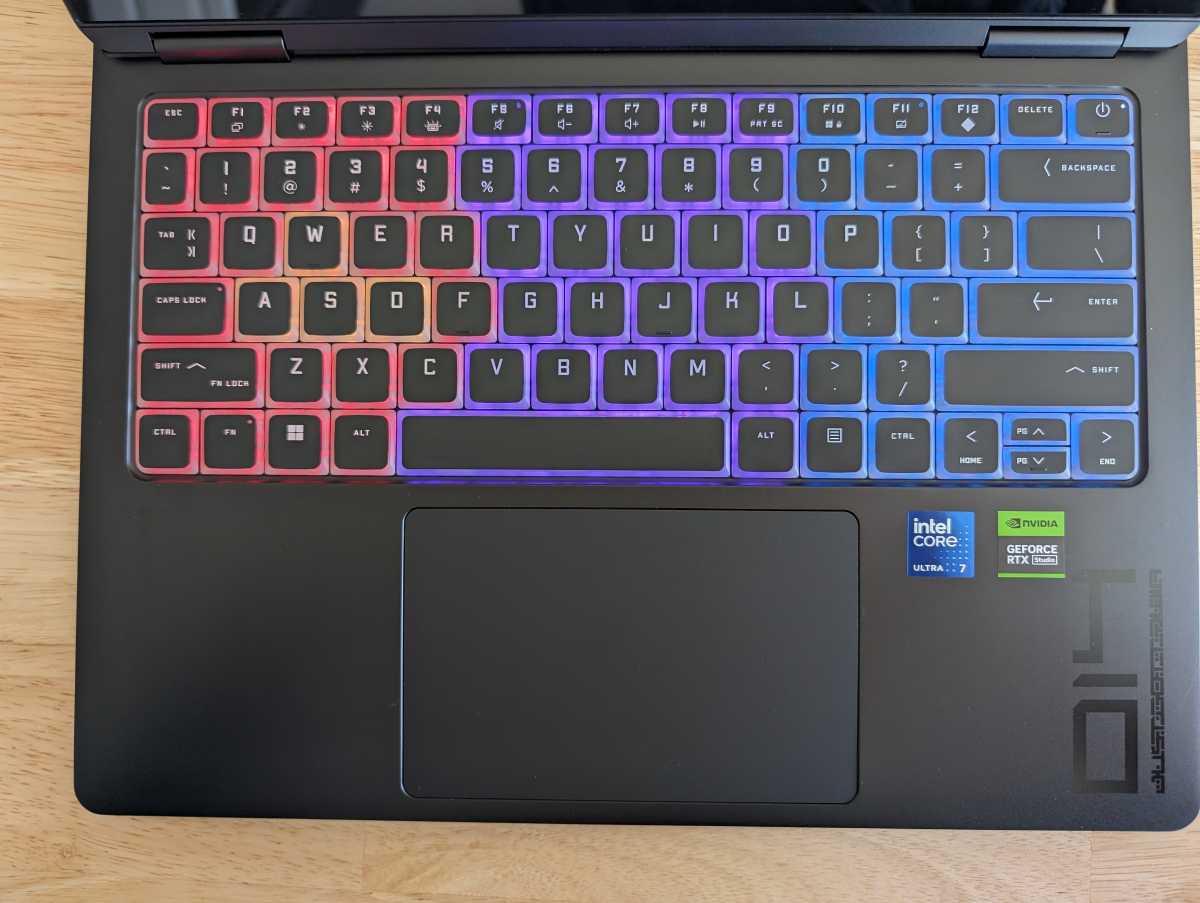
IDG / Chris Hoffman
The laptop’s keyboard and trackpad are both solid and perfectly serviceable. I’ve already talked about how much I like the look of the keyboard thanks to the transparent edges that let the LED lighting shine through.
I wouldn’t say this is a bad keyboard. I will say that I’ve used better. The keys feel a tad mushy. They feel more than fine to type on — but they don’t feel quite as snappy when you press each key down to the bottom. The laptop is so thin that this isn’t a huge surprise — there’s not necessarily as much space for those keys to travel as there is on bulkier, thicker gaming laptops.
The trackpad is spacious, no problems there! I don’t think this is a glass trackpad, and it’s not quite as satisfying to slide your finger over as the trackpad on a high-end business laptop like the Lenovo ThinkPad X1 Carbon. The surface is a little rough compared to a glass trackpad. But it works well enough. It’s a fairly standard trackpad for a Windows laptop in this price range these days. There’s nothing wrong with that.
HP Omen Transcend 14: Display and speakers
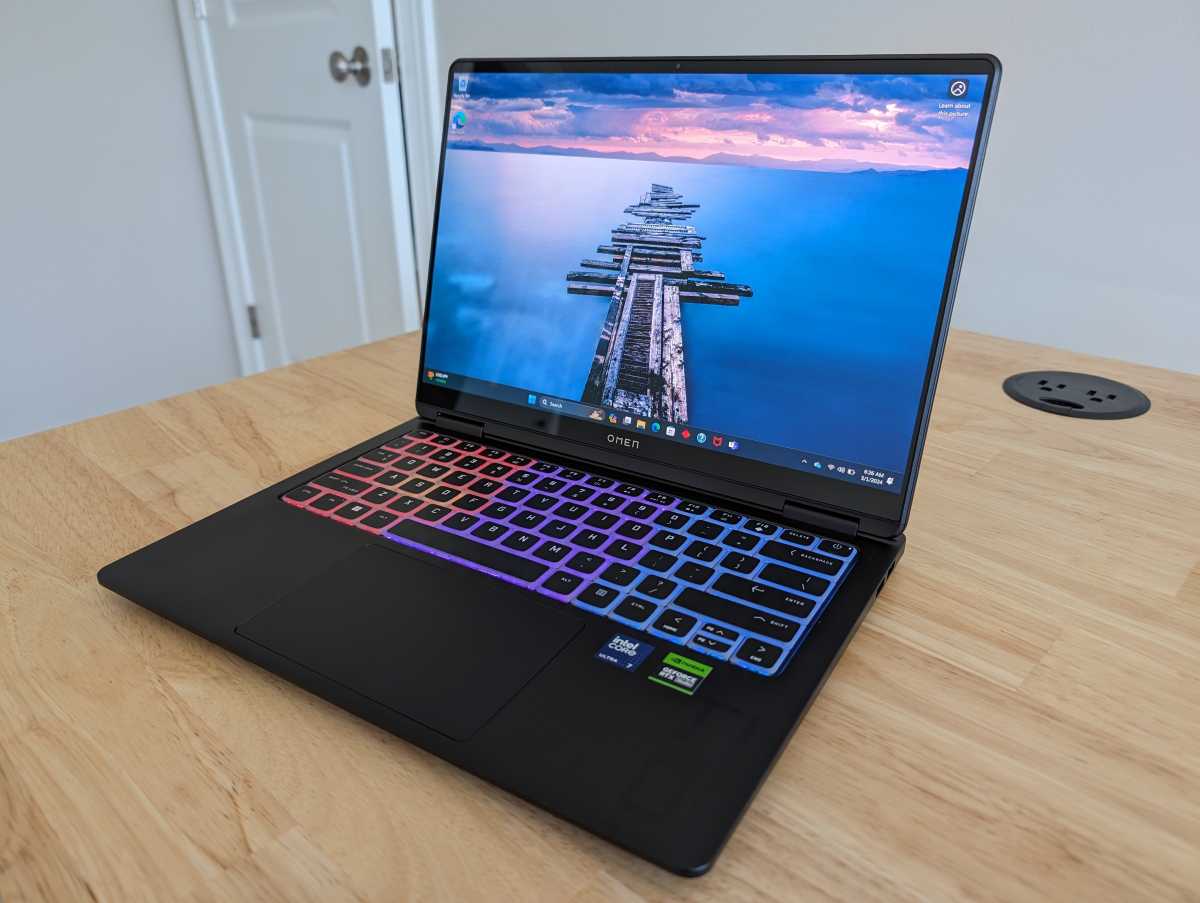
IDG / Chris Hoffman
The HP Omen’s OLED display is the star of the show. It’s a 14-inch 2.8K display (2880×1800 resolution) with HDR support and up to 500 nits of brightness and up to a 120Hz refresh rate. As someone who uses IPS displays on his daily driver PCs, OLED displays like this one look incredibly beautiful to me. The colors on an OLED display really “pop” — they’re much more vibrant.
I love it, and it looks great. Still, there are tradeoffs: The HP Omen Transcend 14 doesn’t support variable refresh rates (VRR) in games. In other words, you won’t find Nvidia G-Sync or AMD FreeSync support here. Also, that 120Hz refresh rate is slower than the refresh rates you’ll find on many IPS panels, which often go up to 240Hz or above.
If you’re shopping for a gaming laptop, there’s no one display technology that’s best for everyone. Personally, I think I would enjoy gaming more on a beautiful OLED display, even if the refresh rate didn’t match an IPS display. But that’s up to you.
The speakers sound good to me — bearing in mind they’re speakers in a 14-inch laptop, naturally. The Omen’s fans don’t get extremely loud while gaming, which helps the speakers deliver good clear audio during gameplay.
HP included a HyperX Cloud III wireless headset with our review model. These headsets normally require a USB dongle, but HP has essentially “built the dongle into the laptop,” letting you use this particular headset without any dongles getting in the way. It’s another boon for the laptop’s portability.
HP Omen Transcend 14: Webcam, microphone, biometrics
The webcam doesn’t look particularly great. While this is a 1080p webcam, the picture isn’t particularly sharp or impressive, even in a brightly colored room. It’s no surprise to find a cheaper webcam in a gaming laptop like this one, and that’s not going to be a big deal to most people. Still, it would be nice to have a better webcam for online meetings since this laptop otherwise seems like it could take the place of an ultraportable.
The microphone is certainly functional. I was not that impressed with the laptop’s built-in microphone, but I wasn’t expecting to be. It’s fine, and people can certainly understand what you’re saying. This isn’t a business laptop, so it’s no surprise to see some compromises made here.
The biometrics work fine: You’ve got a fairly standard IR camera for logging in with your face via Windows Hello. It worked well in various lighting conditions.
HP Omen Transcend 14: Connectivity
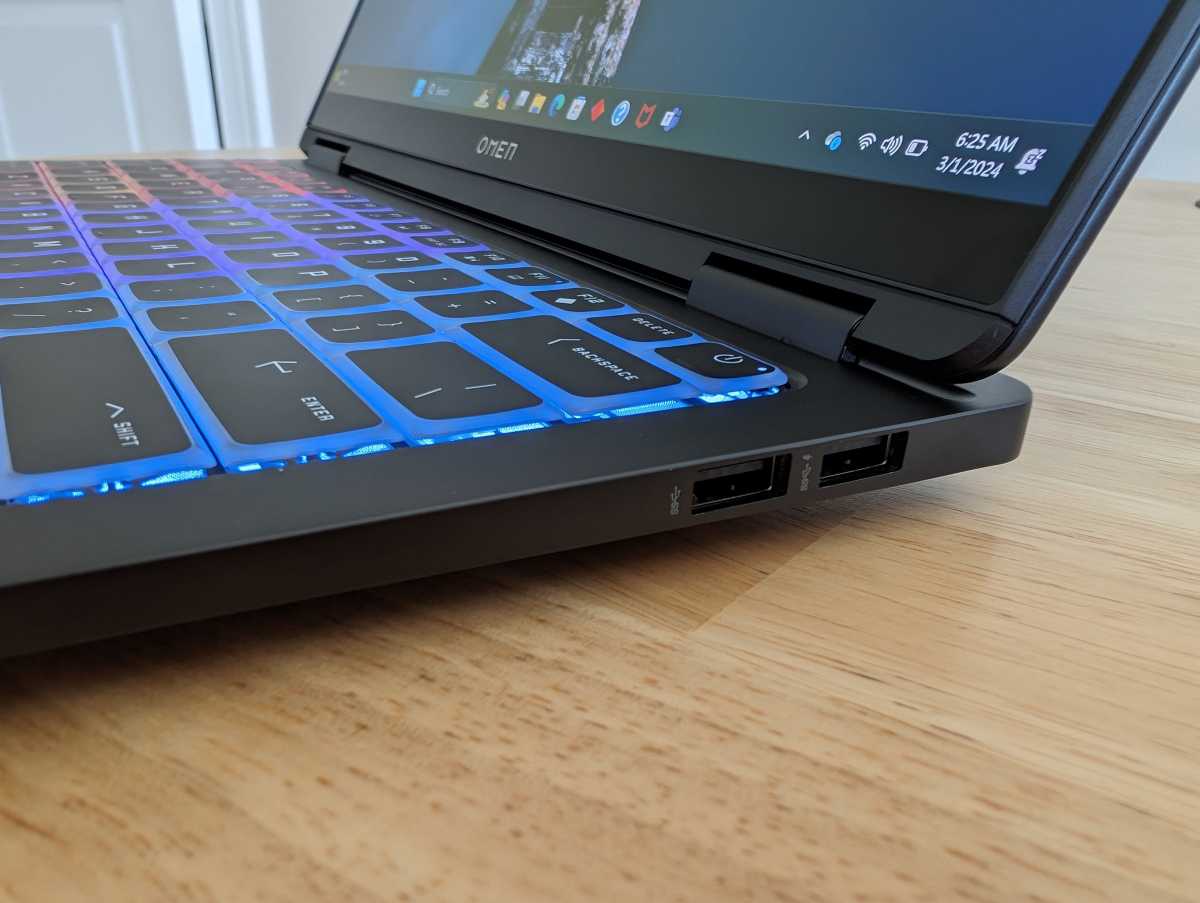
IDG / Chris Hoffman
On the back of the Omen Transcend 14, you’ll find an HDMI 2.1 port as well as a Thunderbolt 4 port (USB-C 4 Gen 2 with 15W Power Delivery and DisplayPort 1.4.) The laptop charges via USB-C, so you’ll probably plug it in to charge here.
On the left of the machine, you’ve got another USB Type-C port along with a combo headphone jack. On the right, you’ll find two USB Type-A ports.
That’s it as far as ports are concerned. There’s no SD card reader or Ethernet jack, for example, so you’ll need a dongle for things like that. That’s no surprise at all — this is a thin and light laptop, and it’s a very reasonable selection of ports.
The laptop we reviewed also included Wi-Fi 7 and Bluetooth 5.4, although many configurations come with Wi-Fi 6E and Bluetooth 5.3. You probably don’t need Wi-Fi 7 just yet — you almost certainly don’t have a Wi-Fi 7 router yet — but it’s really nice to have for futureproofing.
HP Omen Transcend 14: Performance
Let’s get to the performance tests. We ran the HP Omen Transcend 14 through our battery of standard benchmarks to see how it will perform in the real world.
The HP Omen Transcend 14 we reviewed included an Intel Core Ultra 7 155H, which is one of Intel’s new Meteor Lake chips. These new chips are more focused on power efficiency, so there’s no huge performance upgrade. It also packed Nvidia GeForce RTX 4060 graphics, which is more powerful than RTX 4050 graphics, but not up there with a 4070, 4080, or 4090. So we know this laptop doesn’t have the highest-end, fastest components you’d find in a bulkier, more expensive gaming machine — it’s focused on portability and staying compact.
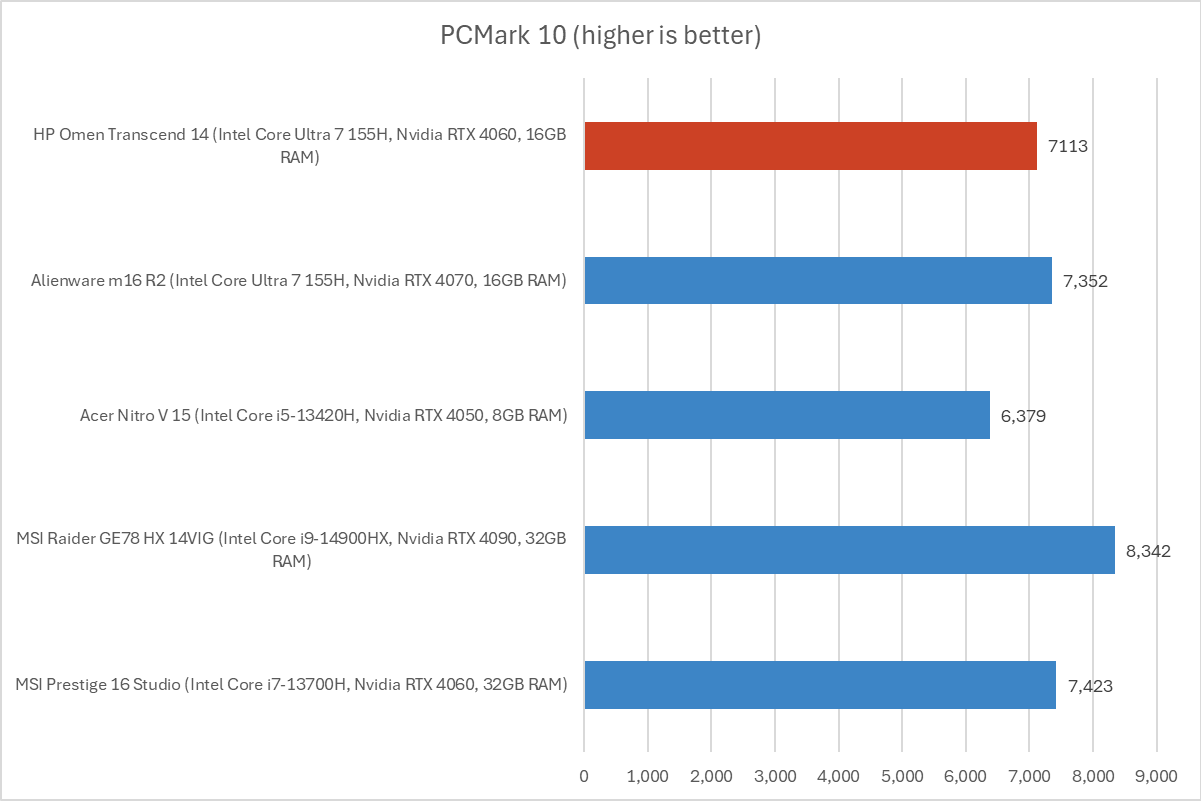
IDG / Chris Hoffman
First, we run PCMark 10. This benchmark is designed as an overall system performance benchmark. It’s an all-around benchmark, but the CPU is more important than the graphics hardware in this benchmark. Gaming performance isn’t the focus for this one.
There are no big surprises in the results. Performance is a bit slower than the Alienware m16 R2, a bulkier, larger, 16-inch laptop with the same CPU and louder fans. The HP Omen beats a laptop with a Core i5 CPU from last year. The much more expensive MSI Raider GE78 laptop with a high-end, power-hungry Intel Core i9 CPU comes out in front of all the other laptops.
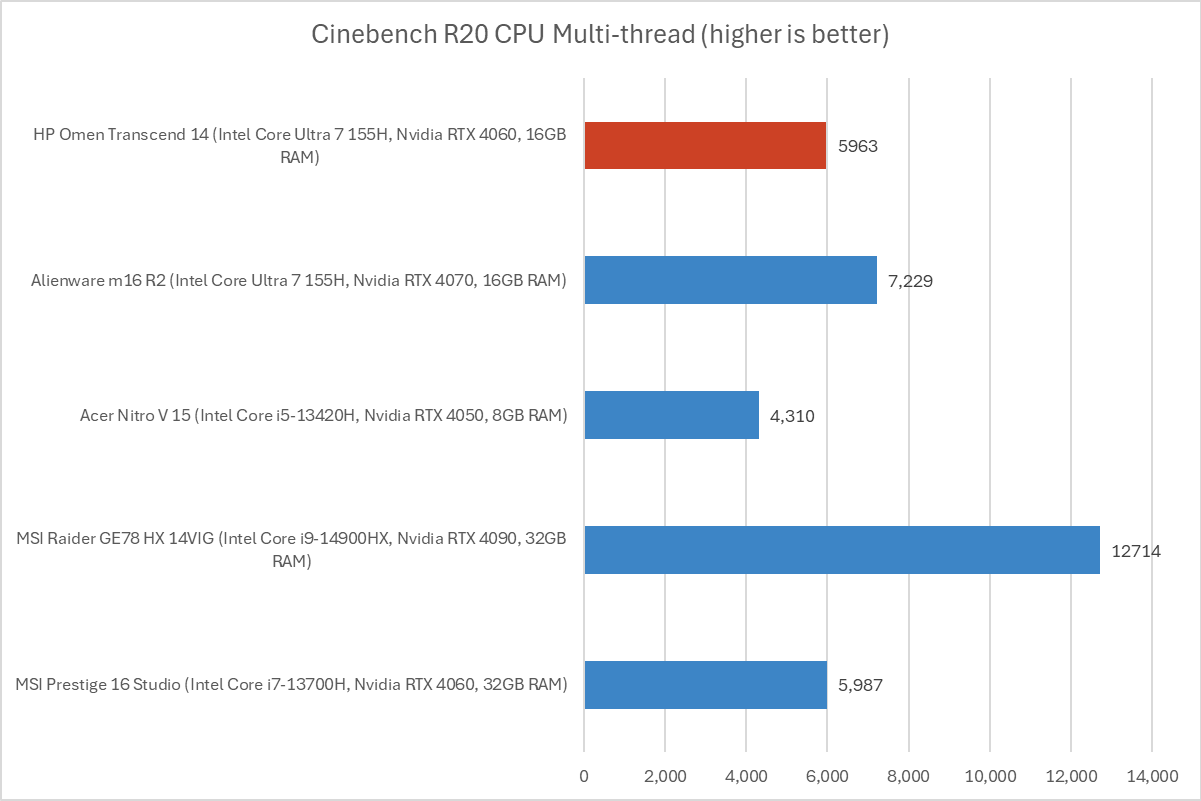
IDG / Chris Hoffman
Next, we move on to Cinebench R20. This is a heavily multithreaded benchmark that looks at CPU performance. It’s a quick benchmark, so cooling and performance under load isn’t a big factor. But, since it’s heavily multithreaded, CPUs with more cores have a massive advantage.
The Omen Transcend beats a laptop with an Intel Core i5 from last year — and it’s within the margin of error of the performance of a Core i7 laptop from last year, too. It is a good amount slower than the Alienware m16 R2, another recently released laptop with the same CPU. That laptop is larger, heavier, uses more power, and has a beefier cooling system with louder fans, so that’s not a huge surprise — but it does show that there’s more to a laptop’s CPU performance than just a CPU model number. (Unsurprisingly, the 24-core Core i9 laptop comes screaming ahead. The HP Omen Transcend has a 16-core CPU.)
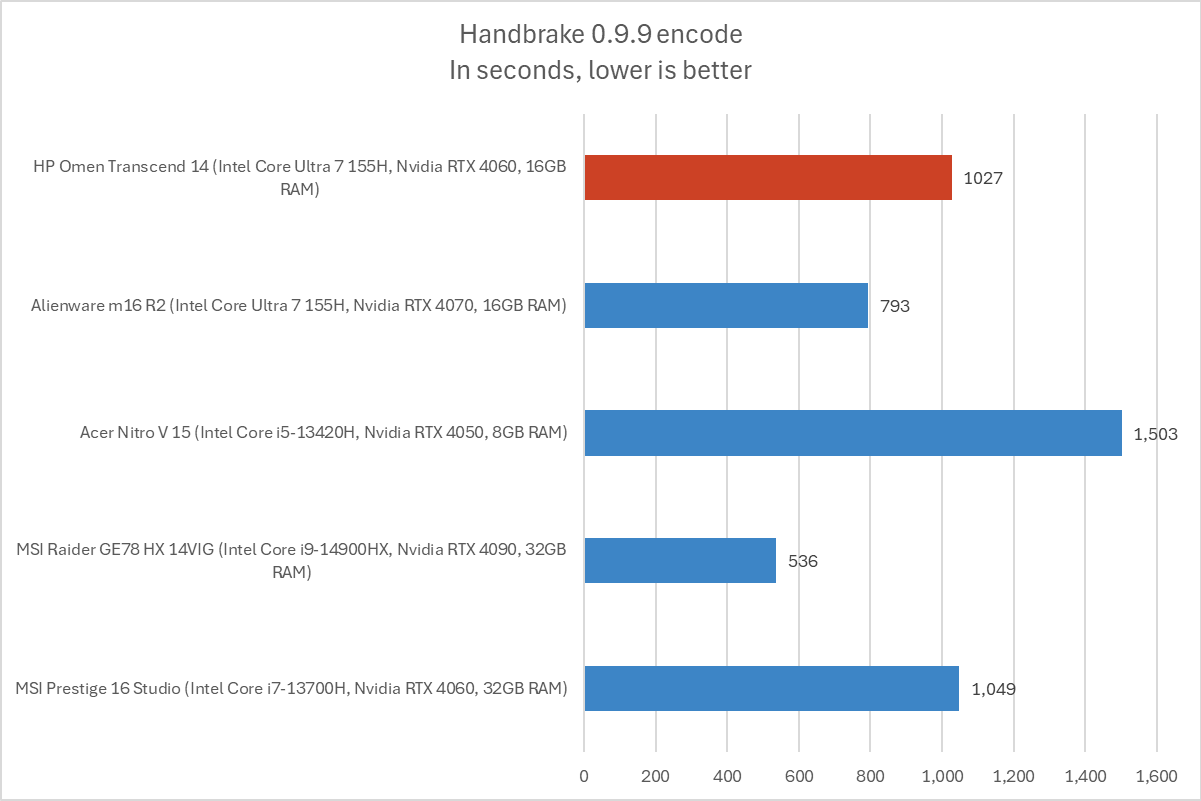
IDG / Chris Hoffman
We also run an encode with Handbrake. This is another heavily multithreaded benchmark, but it takes much longer to complete. This demands the laptop’s cooling kick in, and we can see whether the laptop slows down under load.
Unsurprisingly, that Alienware m16 R2 with the louder fans beats the Omen Transcend 14 once again. But that’s a 16-inch laptop, and this is as more compact 14-inch laptop. What’s really great to see is the HP Omen beating larger laptops from last year — delivering stronger performance than 16-inch laptops with an Intel Core i7 laptop, for example.
Is this the best laptop for sustained CPU performance? Well, no — but we already knew that from the laptop’s compact size. You’ll want a bigger, heavier laptop for that. The performance numbers are not bad, however — not bad at all.

IDG / Chris Hoffman
Now let’s get to the graphics benchmarks so we can focus on GPU performance for gaming. We run 3Dmark Time Spy, a graphical benchmark that highlights the GPU’s performance. The benchmarks show the Omen Transcend 14’s RTX 4060 hardware performing about how you’d expect — faster than a laptop with an RTX 4050, but slower than a laptop with an RTX 4070.
The results show the HP Omen is a little bit slower than the MSI Prestige 16 Studio, a 16-inch laptop with the same GPU. But we found that laptop gets hot and loud under load. The Omen Transcend 14 stays on the cooler side under load, and its fans are on the quiet side for a gaming laptop, too. It’s within spitting distance of that larger machine while being smaller, cooling, and quieter. That feels like an accomplishment.
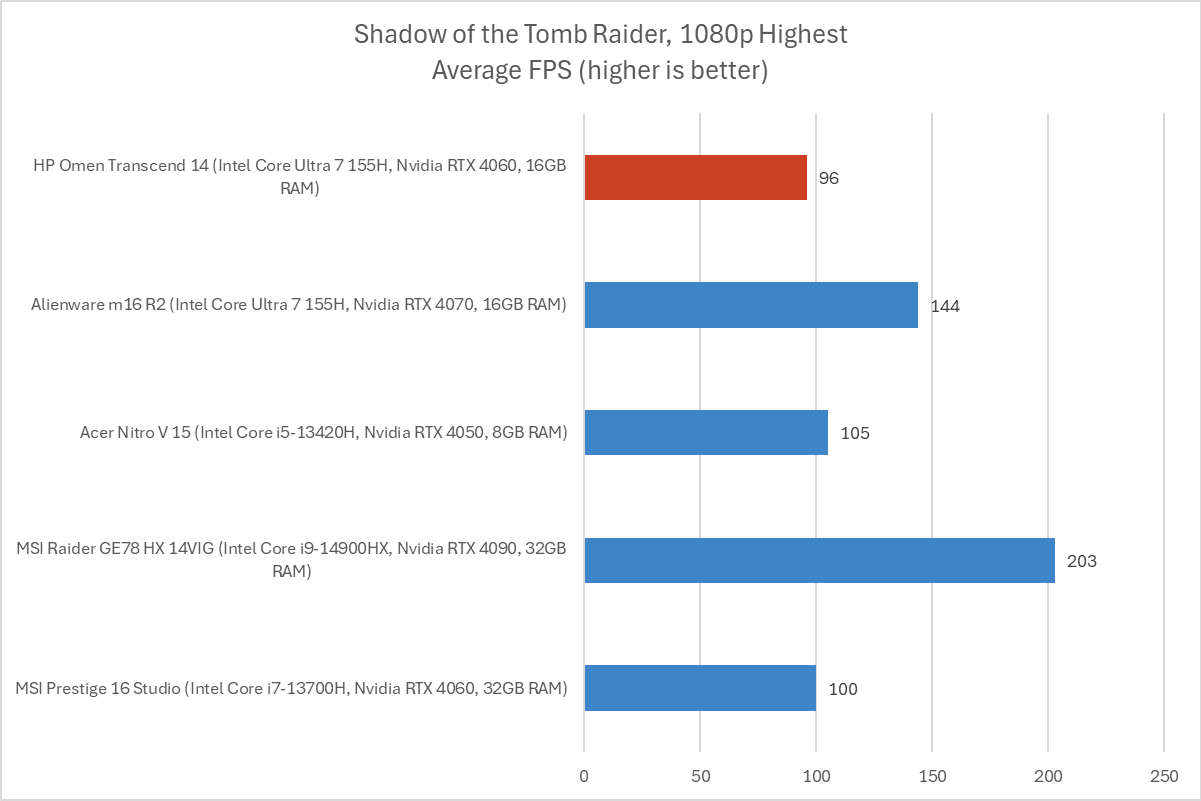
IDG / Chris Hoffman
Let’s look at some actual games. We run the benchmark in Shadow of the Tomb Raider to test all the gaming laptops we review. This is an older game, but it’s an excellent way to compare graphical performance across different PCs.
The HP Omen Transcend achieved 96 frames-per-second in the benchmark. Yes, that’s on the low end for the graph — but every other laptop here is a larger 16-inch laptop. The Omen is delivering comparable performance to larger 16-inch laptops with the same graphics hardware, and only appears truly outclassed by laptops with higher-end GPUs, naturally.
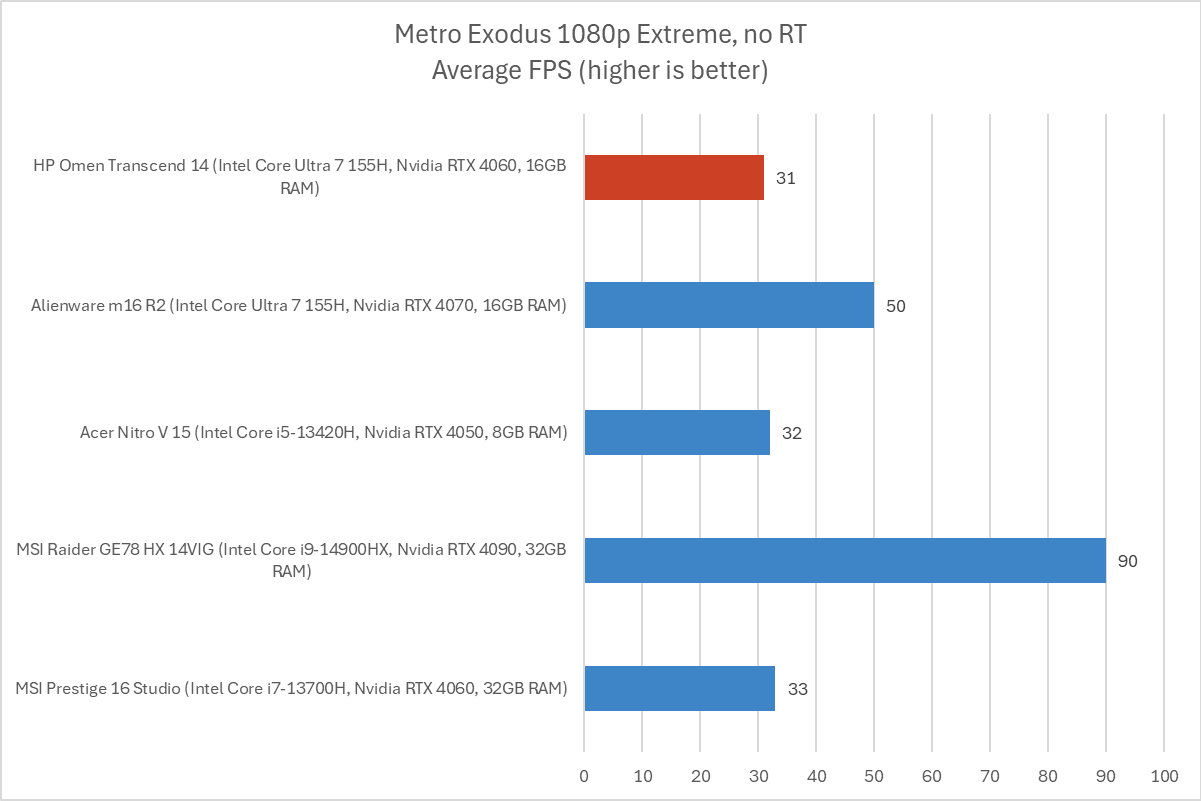
IDG / Chris Hoffman
Lastly, we run the benchmark in Metro Exodus, a more demanding game. We set the benchmark to 1080p resolution at the Extreme detail setting. Once again, the HP Omen Transcend 14 was right in line with larger gaming laptops with similar GPUs at 31 frames-per-second. Only laptops with higher-end RTX 4070 and RTX 4090 graphics pulled noticeably ahead of it.
In most games, GPU performance will be more important than the CPU performance. And, when it comes to the GPU, the HP Omen Transcend 14 is delivering similar performance to laptops that are larger and more power-hungry. That comparable performance comes in a small package that stays cool and runs fairly quiet, too. That’s exactly what we’d want to see from this laptop.
It’s worth noting that this laptop isn’t the best-performing gaming laptop out there. The RTX 4060 is running at 65W of power. That keeps heat and fan noise down. Other laptops with the same RTX 4060 may be providing more power to the GPU and delivering somewhat higher performance — again, at the cost of heat, fan noise, and more power consumption. But, for the size and form factor, it’s very impressive.
HP Omen Transcend 14: Battery life
Battery life is often a weak point for gaming laptops. But the HP Omen Transcend 14 is all about portability, so we’d hope to see some solid battery life and we did.
This HP Omen packs a 71-Watt-hour battery — batteries tend to go up to 100 Watt hours, as that’s the biggest battery the U.S. Transportation Security Administration lets you take on an airplane, but those bigger batteries will be found in larger, heavier laptops.
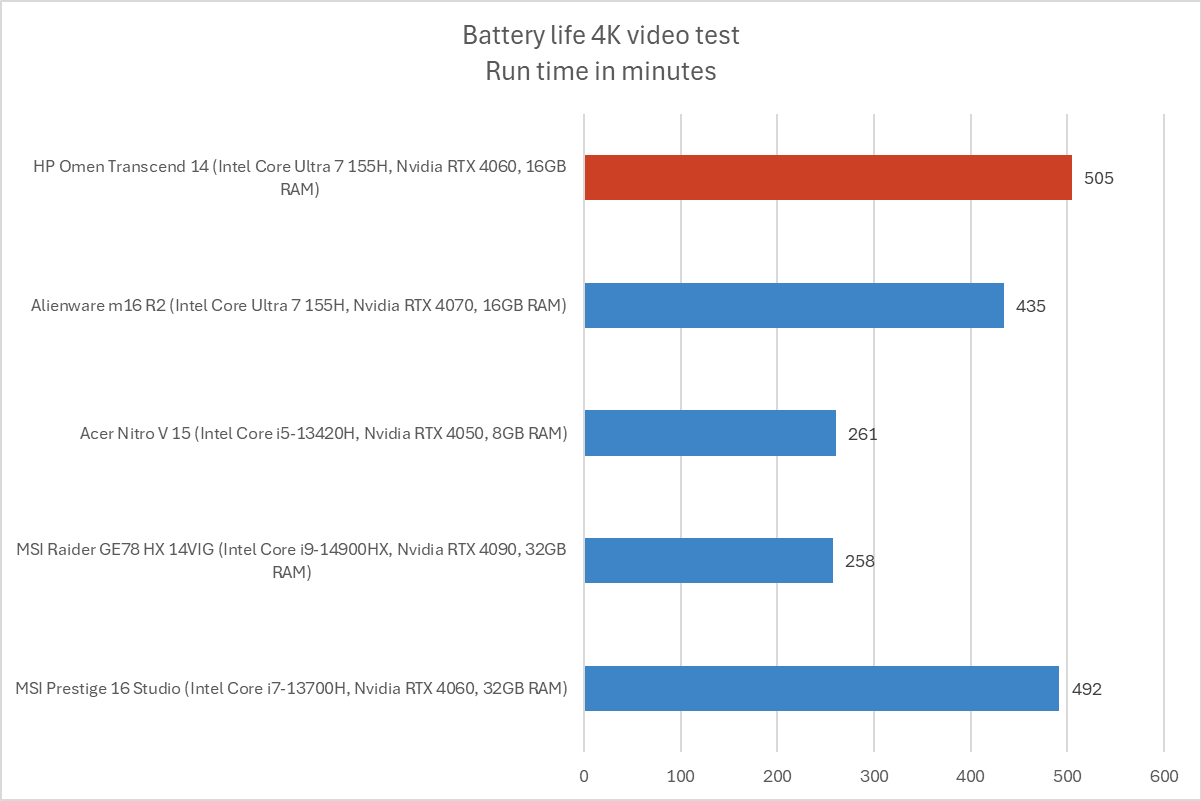
IDG / Chris Hoffman
To benchmark the battery life, we play a 4K copy of Tears of Steel on repeat in the Movies & TV app on Windows 11 with airplane mode enabled and keyboard backlighting disabled until the laptop suspends itself. This is a best-case scenario for any laptop — local video playback is very efficient and battery life in the real world will be less.
We always set the screen to 250 nits of brightness for this. It’s wort noting that the HP Omen Transcend 14 gets an advantage from its OLED display here, as the display needs less power to display the black bars around the video.
We’ve been watching other, larger laptops pull ahead of the HP Omen Transcend 14, so it was great to see HP Omen Transcend 14 pull ahead of them here, running for an average of 505 minutes (nearly eight and a half hours.) That’s exactly what we’re looking to see in a system designed for portability. But bear in mind that this isn’t representative of real-world use and you will see lower battery life runtimes in the real world as you use the laptop normally.
It’s worth noting that HP told us it was seeing longer battery life with the SAGV setting enabled in the system’s BIOS, and that HP may activate that setting by default in the BIOS in the future. We saw the laptop’s battery life improving in our benchmark after enabling this setting, but the numbers we report here are with the laptop’s default settings. SAGV (System Agent Geyserville) offers power savings for the system’s memory when it isn’t being used heavily, so while it may result in significantly longer battery life numbers in a benchmark like this, that won’t necessarily translate to big improvements in the real world — though you can expect to see some improvements.
HP Omen Transcend 14: Conclusion
The HP Omen Transcend 14 is a great machine. It feels like it’s made for someone who isn’t only a gamer — if all you do is leave this on a desk and play games all day, you may still have a great experience thanks to that beautiful OLED screen. But the real value proposition comes once you pick it up and take it places, using it as a slightly heavier than the average ultraportable machine that also delivers great gaming performance when you want it.
With that in mind, the optimal audience here is people who want a great gaming machine with a beautiful screen that can also be lightweight and portable. Everything involves compromises: You can get more performance in a heavier, beefier laptop. And you can get lighter weight in a laptop without a gaming GPU. But this machine is a great compromise: You get a lot of portability and a lot of performance at a great price, and the OLED display is truly special to look at. (I love the LEDs on the keyboard, too — they give the machine a lot of character.)
For maximum performance, you should definitely look elsewhere — but you’re going to get a heavier machine, and if you find a laptop with similar specs that performs better, it will almost certainly have louder fans.
But this is a gaming laptop that really sells that gaming laptops can be more than just powerful, loud, heavy performance-driven beasts. With gaming laptops this affordable, compact, and lightweight, I don’t know why I would buy anything but a gaming laptop in the future.



